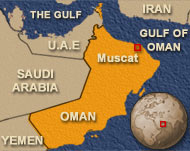Omani women hope to make ground in vote
Omani women are hoping Saturday’s election will boost their position in the country’s advisory council, with women making up more than a third of registered voters for the first time.

But some fear tribal attitudes, and in some cases vote-buying, will stymie their progress in the council, known as the Majlis ash-Shura.
Tribal perceptions of public life as a male preserve, rather than the limited powers of the Majlis, are cited by many in this conservative Gulf sultanate to explain why only 15 women are in the running against 491 men in the country’s first full ballot, down from 21 female candidates three years ago.
But the disclosure that 95,000 of the 262,000 Omanis who have registered to vote are women has raised expectations of a strong showing by female candidates that would increase their share in the 83-strong council from the current two seats – a figure that has remained unchanged since they joined the body in 1994.
Muscat city limits
The victory would be particularly sweet if a woman manages for the first time to clinch a seat outside the capital Muscat.
“My candidacy was a challenge from the start, given that no woman was ever elected outside Muscat,” said Rafia Salman al-Talii, who is running against seven men in the district of al-Kabil in the Sharqiya region, some 200km (125 miles) southeast of the capital.
Talii, an eloquent 32-year-old journalist, said she was easily the most qualified of the candidates in her district and “the only one with a clear platform,” centring on providing education opportunities for youths and “Omanising” jobs.
“A vote for me would be a vote for education and women’s advancement. But let’s face it: tribal and kinship relations are likely to affect voting in this area. Moreover, some candidates are offering financial enticements,” she told French news agencyu FP.
 |
|
Zahra al-Abri, is one of 15 women vying with 491 men for a seat on the council |
Zahra al-Abri, who narrowly lost in a rural area in the last polls in 2000 – when only one in four Omanis was entitled to vote – is trying this time round in the Bausher district of Muscat, but she too blamed tribalism for the small number of female candidates.
“When there is just one seat up for grabs in a constituency, people say ‘how would we give it to a woman? It should go to a man.’ That’s why there are fewer women in the race,” said Abri, 37.
Confidence
Incumbent Lujaina Mohsen Darwish, a businesswoman and scion of a prominent family, was more confident, saying she had a good chance to retain her seat in the capital and hoped to have more female colleagues in the new council.
“People know me. I’ve been with them in good and bad times for the past three years … And even if I fail to get re-elected, I will always be proud of what I could achieve for them through my membership in the council – particularly the paving of a road which cost the government some 470,000 rials ($1.2 million),” she said.
Darwish, 34, said this and her lobbying for other services for her constituency was proof that the Majlis ash-Shura – which has no say in defense, internal security or foreign policy – had adequate powers despite nominally being an advisory body.
 |
|
The Gulf state is taking steps to give women a voice |
“Every person aspires for more (powers for the elected lower house of parliament). But what we need we get. And people are more concerned about economic and social matters than politics,” she told AFP.
“We Omani women are better off than our counterparts in many countries of the region,” she added.
‘Liberated’
Shukoor al-Ghammari, a veteran activist who was one of the first two women to join the Majlis ash-Shura in 1994 and is now one of five women on an appointed council of state, or upper house, agreed that Omani women had gone a long way in a country where they won the right to education only in 1970, after Sultan Qaboos came to power.
“While Omani society is very conservative, women have long participated in men’s assemblies and their opinion was heeded. They’ve long been intellectually liberated,” she said.
Noting that Oman has a woman minister and another serving as ambassador, Ghammari said she expected up to four women to make it into the new Majlis, a step forward that would be consistent with the country’s record of giving women the right to vote and run for public office before any other Gulf state.